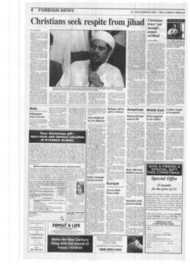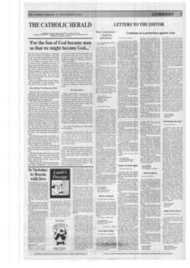Page 3, 21st December 2001
Page 3

Report an error
Noticed an error on this page?If you've noticed an error in this article please click here to report it.
Tags
Share
Related articles
Generous Parishioners Pay Off Decades Of Debt
Third Of Dioceses Face Financial Woes
Bishop Cancels Debt Of Schools In Jubilee Act Of Forgiveness
Financial Chief Bows Out
Cardinal Hume's Appeal Helped To Cut Deficit
Diocese writes off f15 million debt
BY CHRISTINA WHITE
AN ENGLISH DIOCESE is
back in the black from a debt of £.15 million five years ago.
The Shrewsbury diocesan financial report, presented to parishioners this month, details the path to fiscal harmony.
Key measures include the establishment of a central fund scheme enabling parishes to pool resources; the promotion of planned giving and covenants to allow the diocese to benefit from tax breaks and a more responsive approach to property management, with an ongoing building repair and maintenance policy.
The diocese is also maintaining successfully a retired priests' fund to provide for the retirement needs of clergy.
Bishop Brian Noble praised parishioners whose generosity had helped to improve the finances of the diocese he said.
Despite falling Mass attendance, offertory levels have risen: "The continued rise in parish income reflects the tremendous generosity of the people of the diocese, which reflects the commitment and love you have for your parish and the Church," he said.
The diocesan Financial Secretary, Fr John Feeney, paid tribute to the work of his predecessor Mgr McManus who had striven to turn the finances of the diocese around with a centralised banking system and "good housekeeping".
The debt, he explained, was largely the result of massive capital investment and a school building programme in the late 60s. "Large estates were built in places such as Runcorn. The expectation was that these new communities would sustain parishes but with an economic downturn people moved away."
Parishes were faced, he said, with ongoing building and infrastructure costs without the congregations to support the investment.
He praised the efforts of both clergy and congregations: "Once the priests and the people of the diocese realised the problems there was great support."
blog comments powered by Disqus













